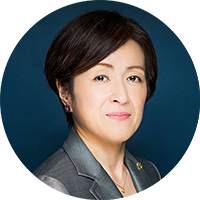Coach's VIEW is a business column authored by executive coaches in COACH A, aimed at providing valuable insights and effective approaches for leveraging coaching to foster organizational and leadership development. The column draws on the latest coaching trends and data, as well as insights from notable global publications on coaching.
What Is the Ability to Think Together?

In the process of executive coaching, there is the utilization of gathering 360-degree feedback. Instead of using standardized questionnaires, clients create their own original surveys. About 3 years ago, in the midst of the COVID-19 pandemic, Ken, the head of the development department of a machinery manufacturer decided to gather feedback from his surroundings in order to enhance his own leadership skills. His objective was to gain valuable insights into what areas of development would be necessary for him moving forward.
One of the questions asked was as follows:
"What changes do you think I (Ken) need to make in order to lead the necessary transformations within our company going forward?"
The responses included answers such as:
"There's nothing in particular."
"Things are fine the way they are now."
Approximately 30% of the respondents provided answers along these lines.
At one of the following sessions, Ken showed up with a somewhat disheartened expression, saying "This is a problem".
The State of Suspended Thinking
The members of Ken's organization are not lacking in motivation. On the contrary, they are diligent, loyal, and hardworking. However, he expressed concern, saying:
"Although it may not sound bad on the surface, hearing responses like 'nothing in particular' or 'Things are fine as they are' makes me worry that there may be a lack of drive to create change within the team. Even if everyone is working diligently, simply following orders and completing tasks is not the type of organization I am striving for."
Ken explained that the phrase "nothing in particular" could mean one of the following:
- No objection.
- No particular interest.
- No particular thoughts.
- Do not want to say anything.
"I feel like they have stopped thinking. They were in a state of suspended thinking. This may work until around 2030, but there would be no future beyond that."
Ken is a young executive who rapidly climbed the ranks in the subsidiary company. Many of his subordinates are older than him by more than 10 years. As a result, his presence is overwhelming, and his subordinates know that if they follow Ken's thinking, things will somehow work out. However, upon reviewing the survey results, he became anxious, thinking, "Can our company really pave the way for the future in this state? I want to gather wisdom from everyone."
Prohibition on Using the Phrase "There's Nothing in Particular"
"What can be done to break free from this state?" Ken came up with a unique idea. He requested that employees refrain from using the phrase "There's nothing in particular" in response to surveys, posts on the internal company SNS, and even during meetings. Ken also requested that if anyone wants to use the phrase "There's nothing in particular," they should respond with "That's great!" instead. The phrase "There's nothing in particular" doesn't convey active agreement, so he wanted people to express their agreement by saying "That's great!".
Ken's objective was to ensure people speak with opinion, regardless of whether they agree or disagree, or even if they have wild opinions. On top of that, Ken's message is also a call to "Bring all ideas to the table and to think together."
As Ken's requests gained wider acceptance, the number of people who expressed their opinions gradually increased. There are people who do not have strong opinions but are reluctant to say "That's great!". These people gradually began to express their own opinions. Ken says, "I want to think together with everyone".
To Think Together
William Isaac(※1) stated the following in a paper he submitted to Organizational Dynamics:
"Regardless of the level of leadership, it is clear in light of the challenges faced by modern global corporations that 'Thinking alone' is no longer appropriate. (Omission) People are seeking to develop the ability to 'Think together' everywhere." (Translation by the author)
What kind of skills are necessary to "Think together"?
Merely conveying our own thoughts to others one-sidedly cannot be considered as "Thinking together." Simply asking for another's opinion is also not enough. Even if speaking about our own thoughts helps to organize them and put them into order, it still cannot be claimed as "Thinking together." The essence of "Thinking together" lies in the emergence of new insights, meanings, and interpretations that arise in the pursuit of a shared goal or objective. It is not a matter of conforming to someone else's point of view nor imposing one's own ideas on others. Rather, it requires creating an environment that surpasses the expectations and assumptions of all participants. That is the meaning of "Thinking together".
To achieve this, it is essential to establish a process that fosters the creation of fresh understandings, meanings, and interpretations while also acknowledging and embracing the differences that exist between individuals. However, while it is easy to speak of the importance of such an approach, it is not always easy to remain open to differences when they become apparent and to allow one's own assumptions to be challenged. If we react defensively or dismissively to the viewpoints expressed by others, it is impossible to truly "think together" in a meaningful way.
Ken declared, "I trust our employees. They all have great ideas.". Through his previous requests, he has guided each individual employee to recognize that their opinions are valuable. I believe this is a necessary step and ability for thinking together. While his approach may be top-down, the opinions and ideas that emerge from it come from the bottom up. How often do we communicate to our subordinates, "We want to hear your opinions. There is value in you sharing your ideas"?
If we can think together and pool our wisdom without being constrained by hierarchy, how powerful would that be? Isn't it exciting just by imagining it?
【REFERENCE】
※1 William N. Isaacs, "Taking flight: Dialogue, collective thinking, and organizational learning",
Autumn 1993, Organizational Dynamics, Volume 22, Issue 2, Pages 24-39
*Regardless of profit, non-profit or intranet, secondary use such as copying, diversion, selling etc. is prohibited without permission.
Language: Japanese

